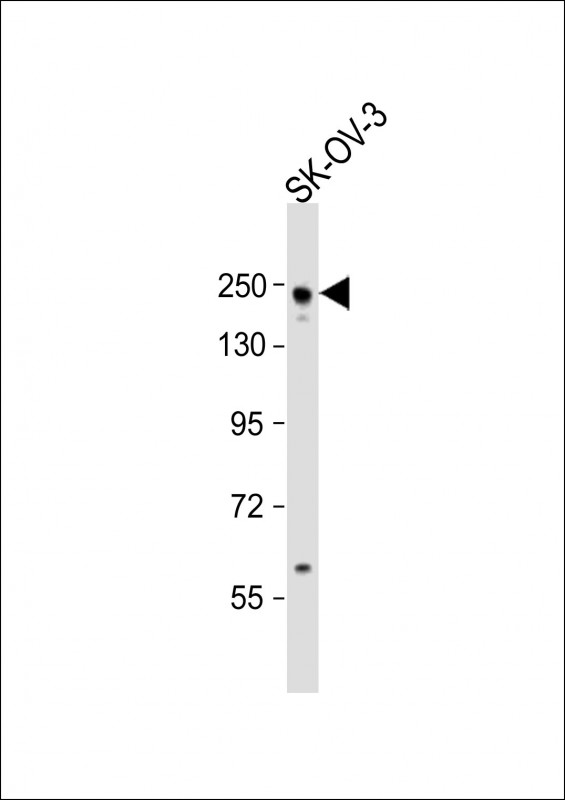
| WB | 1/2000 | Human,Mouse,Rat |
| IF | 咨询技术 | Human,Mouse,Rat |
| IHC | 咨询技术 | Human,Mouse,Rat |
| ICC | 技术咨询 | Human,Mouse,Rat |
| FCM | 咨询技术 | Human,Mouse,Rat |
| Elisa | 咨询技术 | Human,Mouse,Rat |
| Aliases | AT-rich interactive domain-containing protein 1A, ARID domain-containing protein 1A, B120, BRG1-associated factor 250, BAF250, BRG1-associated factor 250a, BAF250A, Osa homolog 1, hOSA1, SWI-like protein, SWI/SNF complex protein p270, SWI/SNF-related, matrix-associated, actin-dependent regulator of chromatin subfamily F member 1, hELD, ARID1A, BAF250, BAF250A, C1orf4, OSA1, SMARCF1 |
| Entrez GeneID | 8289 |
| WB Predicted band size | 242.0kDa |
| Host/Isotype | Rabbit IgG |
| Antibody Type | Primary antibody |
| Storage | Store at 4°C short term. Aliquot and store at -20°C long term. Avoid freeze/thaw cycles. |
| Species Reactivity | Human, Mouse |
| Immunogen | This ARID1A antibody is generated from a rabbit immunized with a KLH conjugated synthetic peptide between 1717-1750 amino acids from human ARID1A. |
+ +
以下是3篇关于ARID1A抗体的代表性文献(信息简化供参考):
---
1. **文献名称**:*ARID1A mutations in ovarian clear cell carcinoma: Molecular markers for clinical stratification*
**作者**:Wiegand KC et al.
**摘要**:本研究利用ARID1A抗体(免疫组化)分析卵巢透明细胞癌样本,发现ARID1A蛋白表达缺失与基因突变高度相关,且与患者预后不良有关,提示ARID1A抗体可作为该癌症的分子诊断标志物。
2. **文献名称**:*Loss of ARID1A expression correlates with gastric cancer progression and predicts poor survival*
**作者**:Wang K et al.
**摘要**:通过ARID1A抗体检测胃癌组织,发现ARID1A蛋白缺失与肿瘤侵袭性增强及总生存期缩短显著相关,提示其在胃癌中的抑癌作用及作为预后指标的潜力。
3. **文献名称**:*ARID1A deficiency in hepatocellular carcinoma: Implications for immune microenvironment remodeling*
**作者**:Li J et al.
**摘要**:采用ARID1A抗体(Western blot/免疫荧光)验证肝癌细胞系中ARID1A蛋白表达,发现其缺失导致肿瘤微环境免疫抑制状态,为ARID1A靶向治疗提供依据。
4. **文献名称**:*Standardization of ARID1A immunohistochemistry in molecular pathology: Technical validation and inter-laboratory concordance study*
**作者**:Jones S et al.
**摘要**:评估不同ARID1A抗体的敏感性和特异性,提出标准化染色流程,确认其在临床检测中区分ARID1A突变型与野生型肿瘤的可靠性。
---
以上文献均聚焦于ARID1A抗体在癌症研究中的技术应用及临床意义,覆盖诊断、预后及机制探索方向。如需具体DOI或年份可进一步补充。
ARID1A (AT-rich interaction domain 1A) is a tumor suppressor gene encoding a key subunit of the SWI/SNF chromatin remodeling complex, which regulates gene expression by modifying chromatin structure. The ARID1A protein, also called BAF250a, plays critical roles in DNA repair, cell cycle control, and differentiation. Somatic mutations in ARID1A are frequently observed in various cancers, including ovarian clear cell carcinoma, endometrial carcinoma, gastric cancer, and hepatocellular carcinoma, often leading to loss of protein expression.
ARID1A antibodies are essential tools for detecting ARID1A protein levels in research and diagnostic settings. These antibodies are widely used in immunohistochemistry (IHC), Western blotting, and immunofluorescence to assess ARID1A expression patterns in tissues or cell lines. In clinical research, loss of ARID1A expression detected by these antibodies correlates with tumor progression, therapeutic resistance, and poorer prognosis in certain cancers. Additionally, ARID1A-deficient cancers may exhibit specific vulnerabilities, such as heightened sensitivity to PARP inhibitors or immune checkpoint therapies, making these antibodies valuable for biomarker-driven therapeutic studies.
Validation of ARID1A antibodies is critical due to potential cross-reactivity with homologous proteins like ARID1B. Researchers often confirm results using multiple clones or orthogonal methods. As ARID1A continues to emerge as a predictive biomarker and potential therapeutic target, reliable antibodies remain indispensable for advancing our understanding of its role in carcinogenesis and treatment response.
×